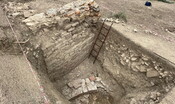Halaesa Arconidea (today Tusa, in the Messina area), was among the first cities in Sicily which, during the First Punic War, chose to submit to the Romans, receiving advantages and privileges in exchange: in the legal and tax structure given to Sicily after the conquest of Syracuse had il privilegio di far parte delle cinque “free and immune cities” and was therefore exempt from the tithe of agricultural products to be sent to Rome and was able to elect its own Senate, its own magistrates and use its own laws. In the Republican age it grew economically, and was a point of reference for Italic merchants: it was one of the four Sicilian cities that obtained the status of municipium before the death of Augustus as indicated by an inscription dedicated to Augustus by the Municipium. It was also prosperous in the imperial age. Such a city could not fail to have a thermal plant: the remains of the structure, of around 800 square meters among the largest on the island, were found during the fifth excavation campaign conducted by the University of Palermo, in collaboration with the archaeological park of Tindari and the municipality of the town in the province of Messina.
The excavations brought to light two rooms with mosaic floors, a courtyard with porticoed wings, a vast monumental complex, hitherto unknown, composed of a network of streets, and a new stretch of fortifications, useful for the reconstruction of a new urban planning of the Hellenistic and Roman city. “Considering the importance of the archaeological finds – said Domenico Targia, interim director of the Tindari archaeological park – the site will immediately be the subject of timely conservative restoration and safety measures, in order to guarantee its valorisation and use” .
“The thermal plant that came to light – said the councilor for cultural heritage, Francesco Paolo Scarpinato – represents a unicum in Sicily for its very rich decorative apparatus and dimensions”. Halaesa Arconidea was founded in 403 BC on a hill overlooking the nearby Tyrrhenian coast and the valley of the Tusa river. Around 269 BC, in the decisive moment of the war between Hiero II and the Mamertines, Alesa, followed by Abaceno and Tindari, handed themselves over spontaneously to Hiero II. Then, the Punic War and a choice that marked his destiny.

https://moskvafeya.top/prostitutki-nedorogo/
https://moskvafeya.top/prostitutki-online/
https://moskvafeya.top/prostitutki-video/
https://moskvafeya.top/raion-novogireevo/
https://moskvafeya.top/raion-taldom/
https://moskvafeya.top/raion-dubna/
https://moskvafeya.top/raion-orehovo-borisovo-yuzhnoe/
https://moskvafeya.top/prostitutki-vyezd/
https://moskvafeya.top/raion-chehov/
https://moskvafeya.top/prostitutki-express/
https://moskvafeya.top/raion-chertanovo-central-noe/
https://moskvafeya.top/raion-tverskoy/
https://moskvafeya.top/sex-maps/
https://moskvafeya.top/raion-sviblovo/
https://moskvafeya.top/raion-lobnya/
https://moskvafeya.top/raiony/
https://moskvafeya.top/raion-otradnoe/
https://moskvafeya.top/raion-beskudnikovskiy/
https://moskvafeya.top/raion-zapadnoe-degunino/
https://moskvafeya.top/raion-klimovsk/
https://moskvafeya.top/raion-sokol/
https://moskvafeya.top/raion-ryazanskiy/
https://moskvafeya.top/raion-egor-evsk/
https://moskvafeya.top/raion-zhukovskiy/
https://moskvafeya.top/raion-biryulevo-vostochnoe/
https://moskvafeya.top/prostitutki-foto-provereno/
https://moskvafeya.top/raion-basmannyy/
https://moskvafeya.top/raion-desenovskoe/
https://moskvafeya.top/raion-arbat/
https://moskvafeya.top/raion-koptevo/